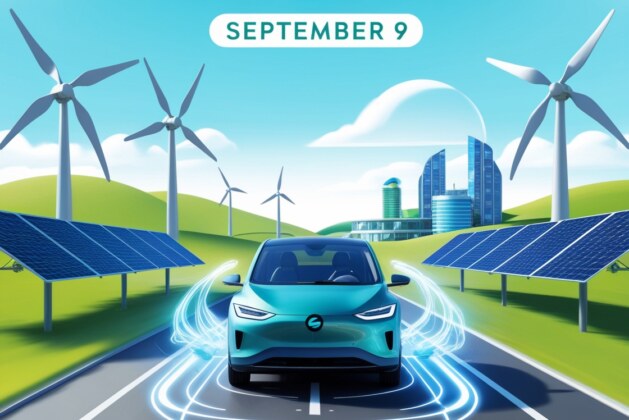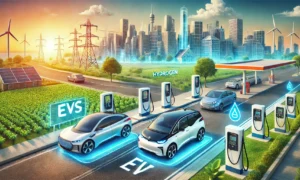World EV Day, observed annually on September 9th, is a global movement dedicated to celebrating and promoting electric mobility. It brings together governments, industries, and EV enthusiasts to raise awareness about the importance of transitioning to electric vehicles (EVs) and adopting sustainable transportation solutions. As India strives toward a cleaner and greener future, World EV Day holds special significance in the country.
In this blog, we’ll explore the significance of World EV Day, the events and initiatives organized in India, and how the nation is embracing the electric revolution.
The Significance of World EV Day
World EV Day was initiated to highlight the global push toward electric mobility as a key component in reducing greenhouse gas emissions, combating climate change, and achieving energy independence. It serves as a reminder that EVs are not just the future—they are a critical part of today’s transportation solutions.
For a country like India, where air pollution and energy dependency are growing concerns, transitioning to electric vehicles is essential. With government initiatives like FAME II (Faster Adoption and Manufacturing of Electric Vehicles),
India aims to have 30% of its vehicles electric by 2030. World EV Day plays a crucial role in amplifying these efforts.
World EV Day Events in India
On World EV Day, various cities across India organize events, forums, and exhibitions to promote electric vehicles and highlight their benefits. Here are some key activities that typically take place:
1. EV Exhibitions and Showcases
Cities like Delhi, Mumbai, Bangalore, and Hyderabad host exhibitions showcasing the latest electric vehicle models, from two-wheelers to electric buses and cars. Leading manufacturers such as Tata Motors, Mahindra Electric, and Ather Energy display their cutting-edge EV technologies, offering the public an opportunity to explore, test-drive, and understand EVs firsthand.
2. Government-Led Initiatives
On World EV Day, the Indian government often takes the opportunity to launch or announce new policies, subsidies, and initiatives to promote electric mobility. In 2023, the Ministry of Heavy Industries and Public Enterprises launched several charging infrastructure initiatives to make EV adoption easier for consumers.
3. Awareness Campaigns
Across India, numerous awareness campaigns are run to educate the public about the benefits of EVs. NGOs, environmental organizations, and government bodies organize seminars, workshops, and digital campaigns to dispel myths about electric vehicles, highlight their economic and environmental advantages, and explain the long-term cost savings associated with owning an EV.
4. Public Test Drives
To encourage EV adoption, many cities offer free public test drives of electric vehicles. This hands-on experience allows people to feel the power, smoothness, and efficiency of EVs, helping dispel any doubts they might have about transitioning from traditional internal combustion engine vehicles.
5. EV Charging Infrastructure Announcements
To support the growing number of EVs, charging infrastructure plays a critical role. On World EV Day, new EV charging stations are often inaugurated across urban areas and highways. Companies such as Tata Power, Fortum India, and other energy providers collaborate with governments to install fast chargers at key locations.
India’s Growing Commitment to Electric Mobility
India’s dedication to electric vehicles is evident in its ambitious goals. Under the National Electric Mobility Mission Plan (NEMMP) and FAME II, the government has laid out incentives for both manufacturers and buyers of electric vehicles. Some of the initiatives include:
- Subsidies for EV buyers: Financial incentives to make EVs more affordable for consumers.
- Tax exemptions: Reduced GST rates for EV purchases.
- Subsidies for charging infrastructure: Grants and subsidies to support the expansion of public EV charging stations across the country.
- State-level policies: Many states, such as Maharashtra, Delhi, and Karnataka, have introduced their own EV policies to promote electric mobility through subsidies and local incentives.
These efforts highlight India’s strong commitment to reducing its carbon footprint and enhancing the accessibility of electric vehicles for all citizens.
The Future of Electric Mobility in India
World EV Day is just a small part of India’s larger mission to transition to sustainable transportation. In the coming years, we can expect:
- Wider adoption of electric vehicles: As prices continue to drop and more models become available, EV adoption will accelerate.
- Expansion of charging infrastructure: India’s highway networks and cities will become increasingly EV-friendly, with fast chargers available in most major locations.
- Growth in electric two-wheelers: With companies like Ola Electric, Ather, and Hero Electric leading the charge, electric scooters and bikes are becoming a popular choice for urban commuters.
- Focus on electric public transportation: Electric buses are already being deployed in several cities, and this trend will continue, reducing pollution in high-traffic urban areas.
Conclusion
World EV Day serves as a global call to action, urging individuals, businesses, and governments to adopt sustainable transportation solutions. In India, the day is marked by celebrations, events, and initiatives aimed at boosting awareness and accelerating the transition to electric mobility. With ambitious goals and growing momentum, India is poised to be a leader in the electric vehicle revolution, ensuring a cleaner, greener future for all.




Leave a comment